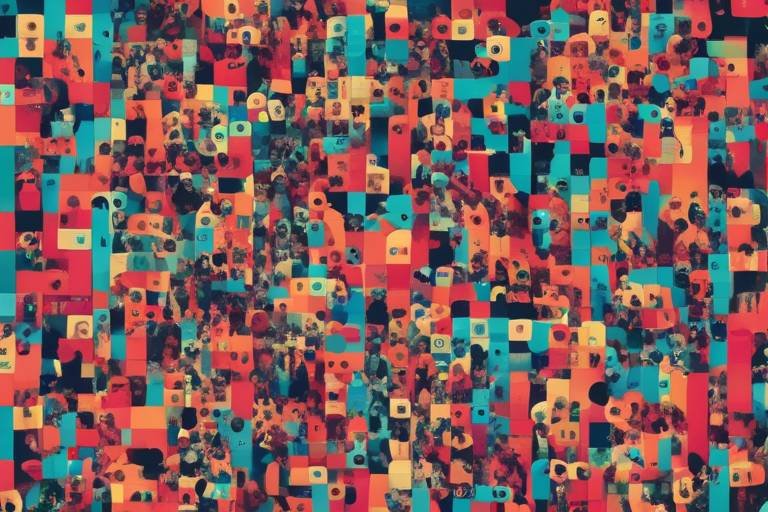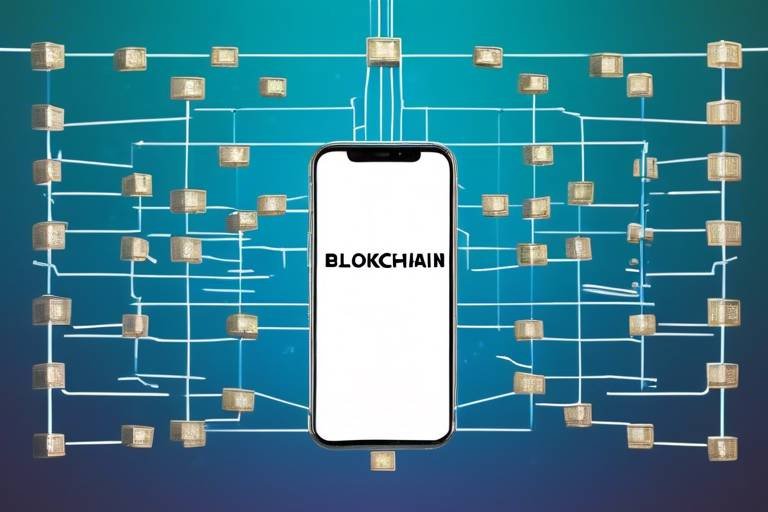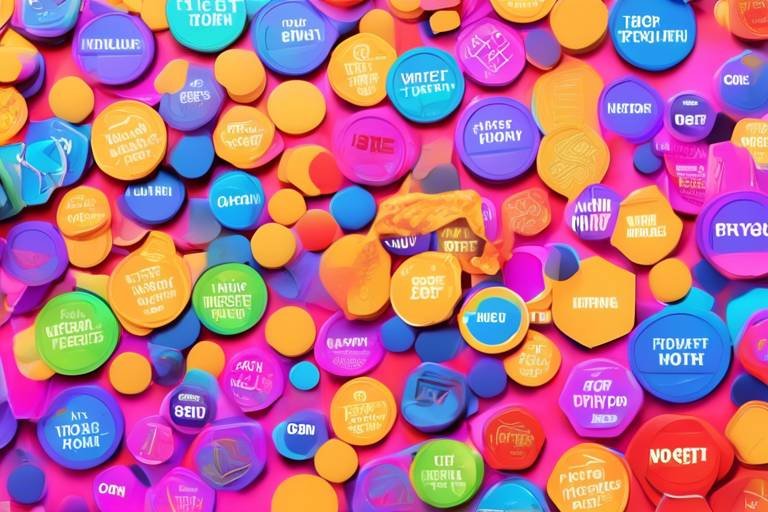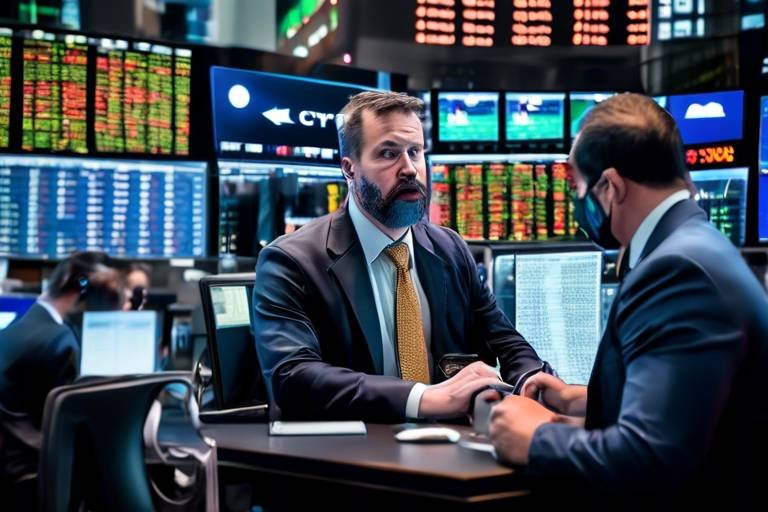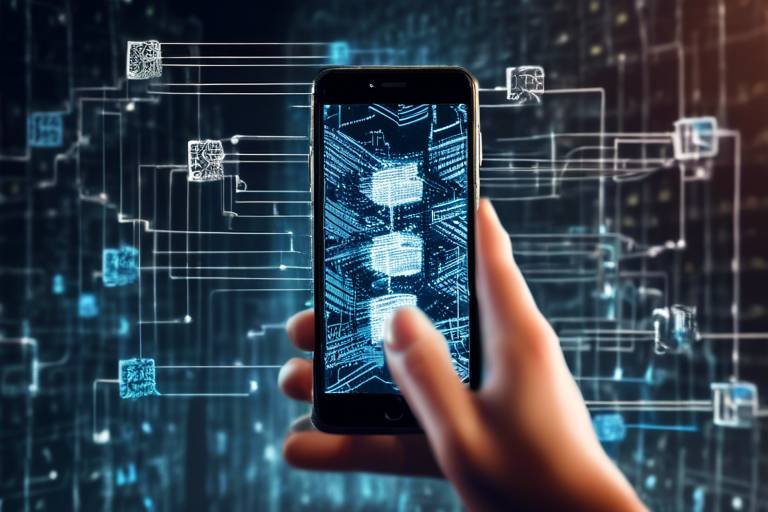Exploring Decentralized Autonomous Organizations (DAOs)
In the rapidly evolving digital landscape, the emergence of Decentralized Autonomous Organizations, or DAOs, has sparked a revolution in how we think about governance and organizational structure. Imagine a world where organizations operate without a central authority, relying instead on smart contracts and community consensus. Sounds futuristic, right? Well, that future is now. DAOs represent a paradigm shift, transforming traditional business models into more democratic and inclusive systems. But what exactly are DAOs, and how do they function?
At their core, DAOs are digital entities that operate on blockchain technology. They are governed by smart contracts—self-executing contracts with the terms of the agreement directly written into code. This means that decisions are made collectively by members, rather than dictated by a single leader or board. The autonomy of these organizations stems from their decentralized nature, which eliminates the need for intermediaries and allows for more direct participation from stakeholders.
But why should we care about DAOs? Well, they promise a level of transparency and accountability that is often lacking in traditional organizations. Every decision made, every transaction processed, and every rule enforced is recorded on the blockchain, visible to all participants. This transparency fosters trust and encourages greater engagement from community members, creating a more vibrant and active organization. Imagine being part of a community where your voice matters, where decisions are made collectively, and where you can see the impact of your contributions in real time. That's the power of DAOs.
Moreover, DAOs can significantly reduce operational costs. By eliminating the need for intermediaries—like managers, brokers, or even entire departments—resources can be redirected towards innovation and growth. Think of it as cutting out the middleman in a business deal; the savings can be substantial. This efficiency not only enhances profitability but also allows organizations to reinvest in their communities and projects, fostering a cycle of continuous improvement.
However, it's essential to recognize that the journey of DAOs is not without its challenges. The legal landscape surrounding these organizations is still developing, and many jurisdictions have yet to define the regulatory framework that governs them. Additionally, security risks, such as hacking and vulnerabilities in smart contracts, pose significant threats to the integrity of DAOs. Thus, while the potential benefits are immense, they must be weighed against these challenges to ensure a sustainable future for decentralized governance.
In conclusion, exploring the world of DAOs opens up a realm of possibilities for governance and business models in the digital age. As we continue to innovate and adapt, understanding the foundations, benefits, and challenges of DAOs will be crucial for anyone looking to navigate this exciting landscape.
- What is a DAO? A DAO is a decentralized autonomous organization that operates on blockchain technology, governed by smart contracts and community consensus.
- How are decisions made in a DAO? Decisions are made collectively by members, often through voting mechanisms embedded in the smart contracts.
- What are the benefits of DAOs? Key benefits include transparency, reduced operational costs, and increased community engagement.
- What challenges do DAOs face? DAOs face challenges such as regulatory ambiguity, security risks, and governance issues.

Understanding DAOs
This article delves into the concept of DAOs, their structure, benefits, challenges, and their impact on governance and business models in the digital landscape.
Decentralized Autonomous Organizations, or DAOs, represent a groundbreaking shift in how organizations can operate in the digital realm. Imagine a company that runs entirely on code, where decisions are made through community consensus rather than a hierarchy of managers. At its core, a DAO is a digital entity governed by smart contracts—self-executing contracts with the terms of the agreement directly written into code. This innovative framework allows for a level of transparency and efficiency that traditional organizations often struggle to achieve.
One of the foundational principles of DAOs is their decentralization. Unlike conventional organizations that have a central authority, DAOs distribute decision-making power among their members. This means that every stakeholder has a voice, and decisions are made collectively rather than unilaterally. This shift not only democratizes governance but also aligns the interests of the organization with those of its members, fostering a sense of community and shared purpose.
DAOs differ from traditional organizations in several key ways:
- Governance Structure: In DAOs, governance is often based on token ownership, where members hold tokens that grant them voting rights. This is a stark contrast to traditional organizations, where decisions are typically made by a select few individuals at the top.
- Operational Efficiency: DAOs leverage smart contracts to automate processes, reducing the need for intermediaries and streamlining operations. This can lead to faster decision-making and lower costs.
- Transparency: Every transaction and decision made within a DAO is recorded on the blockchain, ensuring complete transparency. This level of openness is rarely seen in traditional organizations.
In essence, DAOs are not just a technological innovation; they are a new paradigm in organizational structure. They challenge the conventional norms of management and governance, paving the way for a more inclusive and equitable approach to decision-making. As we delve deeper into the benefits and challenges of DAOs, it's essential to understand how their unique characteristics can influence various sectors, from finance to social movements.
What is a DAO?
A DAO, or Decentralized Autonomous Organization, is an organization represented by rules encoded as a computer program that is transparent, controlled by organization members and not influenced by a central government.
How do DAOs make decisions?
Decisions in a DAO are made through a voting process where members can vote on proposals based on the number of tokens they hold, thus ensuring that all stakeholders have a say in the governance of the organization.
What are smart contracts?
Smart contracts are self-executing contracts with the terms of the agreement directly written into code. They automate processes and enforce rules within a DAO, ensuring accountability and efficiency.
What are the main benefits of DAOs?
Some of the key benefits include increased transparency, reduced operational costs, and enhanced community engagement, which can lead to more democratic governance models.
Are there any risks associated with DAOs?
Yes, DAOs face challenges such as regulatory concerns, security risks, and potential governance issues, which need to be carefully managed to ensure their success.

Benefits of DAOs
Decentralized Autonomous Organizations (DAOs) are not just a passing trend; they are revolutionizing the way we think about governance and business in the digital age. Imagine a world where decisions are made collectively, transparently, and efficiently, without the need for a central authority. This is the promise of DAOs! They offer a myriad of benefits that can transform various sectors, making them more responsive and adaptable to the needs of their communities.
One of the standout advantages of DAOs is their transparency. In traditional organizations, decision-making processes can often be murky, leaving stakeholders in the dark. DAOs, on the other hand, operate on blockchain technology, which means that every decision, every transaction, and every rule is recorded on a public ledger. This level of transparency fosters trust among community members and stakeholders, as everyone can see how decisions are made and funds are allocated. It's like having a glass house where everyone can see the inner workings, promoting a culture of accountability and shared responsibility.
Furthermore, the use of smart contracts within DAOs automates processes and enforces rules without the need for intermediaries. These self-executing contracts are programmed to execute actions when certain conditions are met, ensuring that operations run smoothly and efficiently. For instance, if a community votes to allocate funds for a project, a smart contract can automatically release those funds once the vote reaches a consensus. This not only saves time but also minimizes the risk of human error or manipulation, creating a reliable framework for governance.
Another significant benefit of DAOs is their ability to enhance community engagement. In a DAO, every member has a voice, and their opinions can directly influence decisions. This democratic approach to governance encourages active participation and fosters a sense of ownership among members. Imagine being part of a community where your voice truly matters—where you can propose initiatives, vote on critical issues, and collaborate with others to shape the future of the organization. This level of engagement can lead to more innovative solutions and a stronger sense of community, as everyone feels invested in the success of the organization.
Moreover, DAOs can achieve remarkable cost efficiency by cutting out intermediaries. Traditional organizations often incur significant costs associated with management, administration, and compliance. DAOs eliminate these layers, allowing resources to be redirected toward innovation and growth. For example, instead of paying for a management team to oversee operations, a DAO can operate on a flat structure where decisions are made collectively, reducing overhead costs significantly. This financial flexibility can empower organizations to invest more in their projects and initiatives, ultimately driving progress.
In summary, the benefits of DAOs are multifaceted, ranging from enhanced transparency and community engagement to cost efficiency and automation through smart contracts. They represent a paradigm shift in how organizations can operate, paving the way for more democratic and inclusive governance models. As we continue to explore the potential of DAOs, it's clear that they hold the key to unlocking new opportunities in the digital landscape.
Here are some common questions regarding the benefits of DAOs:
- What is the primary benefit of DAOs? The primary benefit is transparency, which builds trust among community members.
- How do smart contracts enhance DAO operations? Smart contracts automate processes, ensuring efficiency and reducing the risk of human error.
- Can anyone participate in a DAO? Yes! DAOs are designed to be inclusive, allowing every member to have a say in decision-making.
- How do DAOs save costs? By eliminating intermediaries and traditional management structures, DAOs can significantly reduce operational costs.

Transparency in Governance
When we talk about Decentralized Autonomous Organizations (DAOs), one of the standout features that captures attention is their commitment to transparency. Imagine a world where every decision, every transaction, and every rule is laid bare for everyone to see. This is the essence of transparency in DAOs. Unlike traditional organizations, where information can be shrouded in secrecy, DAOs operate on the principle that knowledge is power, and sharing it fosters trust and collaboration among members.
In a DAO, the governance structure is encoded in smart contracts, which are self-executing contracts with the terms of the agreement directly written into code. This not only ensures that everyone involved can see the rules but also guarantees that they are enforced without bias. For instance, when a proposal is made, the voting process is visible to all members, allowing them to scrutinize the actions of their peers. This level of visibility is revolutionary and can significantly enhance the decision-making process. In a traditional setting, decisions might be made behind closed doors, leading to distrust and skepticism. In contrast, DAOs invite their members to be part of the conversation, creating a culture of openness.
Moreover, transparency in governance doesn't just stop at visibility; it also encourages accountability. When members know that their actions are being monitored, they are more likely to act in the best interest of the organization. This accountability is crucial for fostering a sense of community and shared responsibility. For example, if a member proposes a project that requires funding, the entire community can weigh in, discuss its merits, and ultimately decide whether to approve it. This process not only democratizes decision-making but also ensures that funds are allocated wisely, which is vital for the sustainability of any organization.
However, it’s essential to recognize that transparency also comes with its challenges. While it can enhance trust, it can also expose organizations to potential risks, such as information overload or the possibility of malicious actors attempting to manipulate data. Therefore, DAOs must strike a balance between transparency and security. A well-designed DAO will implement robust security measures to protect sensitive information while maintaining an open governance structure.
In summary, the transparency in governance offered by DAOs is a game-changer. It not only promotes trust and accountability but also empowers members to take an active role in shaping the future of the organization. As the digital landscape continues to evolve, the principles of transparency and community engagement will likely become the cornerstones of successful governance models. DAOs are paving the way for a new era where everyone has a voice, and every action is visible, making the governance process not just a necessity but a shared journey towards collective success.

Smart Contracts
Smart contracts are the beating heart of Decentralized Autonomous Organizations (DAOs), enabling them to function without the need for intermediaries. Imagine a vending machine: you insert money, select your snack, and the machine automatically dispenses it without any human intervention. That's how smart contracts operate—self-executing contracts with the terms of the agreement directly written into code. This innovative technology not only automates processes but also ensures that the rules are enforced transparently and consistently.
At their core, smart contracts are built on blockchain technology, which provides a secure and immutable ledger for all transactions. This means that once a smart contract is deployed, it cannot be altered, making it an incredibly reliable mechanism for governance within DAOs. For instance, if a DAO decides to allocate funds for a community project, a smart contract can be programmed to release those funds automatically when certain predefined conditions are met. This level of automation not only enhances efficiency but also reduces the potential for human error or manipulation.
Moreover, the use of smart contracts in DAOs promotes accountability and transparency. All stakeholders can view the contract's terms and the transactions that occur, creating an environment of trust. When everyone has access to the same information, it diminishes the chances of disputes and enhances collaborative decision-making. To illustrate this point, consider the following table that outlines the key features of smart contracts:
| Feature | Description |
|---|---|
| Automation | Executes transactions automatically when conditions are met. |
| Immutability | Once deployed, the contract cannot be changed or tampered with. |
| Transparency | All parties can view the contract and its transactions. |
| Cost-Effective | Reduces the need for intermediaries, lowering transaction costs. |
In addition to these features, smart contracts can also facilitate complex governance structures within DAOs. For example, they can be programmed to allow token holders to vote on proposals, with the outcome automatically enforced by the contract. This not only streamlines the decision-making process but also ensures that every voice is heard in a fair and equitable manner. The beauty of this system lies in its ability to create a truly democratic environment where power is distributed among all participants.
However, while smart contracts offer numerous advantages, they are not without their challenges. The code that underpins these contracts must be meticulously written and audited to avoid vulnerabilities that could be exploited by malicious actors. As DAOs continue to gain traction, the importance of robust security measures cannot be overstated. After all, a single flaw in a smart contract can lead to significant financial losses and undermine the trust that is essential for the success of any DAO.
In conclusion, smart contracts are revolutionizing the way DAOs operate, providing a framework for automated, transparent, and efficient governance. As this technology continues to evolve, it holds the potential to redefine not only how organizations function but also how we think about trust and accountability in the digital age.
- What is a smart contract? A smart contract is a self-executing contract where the terms are directly written into code, enabling automated and transparent execution of agreements.
- How do smart contracts enhance trust? They provide a transparent and immutable record of transactions, ensuring all parties have access to the same information.
- What are the risks associated with smart contracts? Risks include potential coding errors, security vulnerabilities, and the need for thorough auditing to prevent exploitation.

Community Engagement
In the realm of Decentralized Autonomous Organizations (DAOs), is not just a buzzword; it's the lifeblood that fuels these innovative entities. Imagine a vibrant marketplace where every voice matters, where decisions aren't just handed down from on high, but crafted collaboratively by the very people who are affected by them. This is the essence of DAOs, where community involvement transforms the traditional governance model into something far more dynamic and inclusive.
At the heart of community engagement in DAOs is the principle of collective decision-making. Unlike conventional organizations where a select few make the calls, DAOs empower all members to participate in shaping the future of the organization. This is often facilitated through voting mechanisms embedded in smart contracts, allowing members to propose, discuss, and vote on various initiatives. For instance, imagine a DAO focused on environmental sustainability; community members could propose projects like tree planting or clean-up campaigns and vote on which initiatives to fund. This not only fosters a sense of ownership but also ensures that the projects align with the community's values and priorities.
Moreover, community engagement in DAOs can lead to greater innovation. When diverse voices come together, they bring unique perspectives and ideas to the table. This melting pot of creativity can spark innovative solutions that a homogenous group might overlook. In a DAO, every member can contribute their insights, leading to a more robust and adaptable organization. Think of it as a brainstorming session where every idea is valued, and the best ones rise to the surface through collaborative effort.
However, engaging a community isn't without its challenges. It requires ongoing communication, transparency, and a genuine commitment to inclusivity. DAOs must create an environment where members feel comfortable expressing their opinions and where their contributions are recognized. This can be achieved through regular updates, open forums, and feedback mechanisms that allow for continuous dialogue. For example, a DAO might hold bi-weekly virtual town halls where members can discuss ongoing projects, share ideas, and voice concerns. This kind of engagement not only strengthens community bonds but also enhances trust and loyalty among members.
In conclusion, community engagement is a cornerstone of DAOs that not only enhances decision-making but also drives innovation and fosters a sense of belonging. As we move further into the digital age, the ability of DAOs to harness the collective wisdom of their communities will undoubtedly shape the future of governance and organizational structures. By prioritizing community involvement, DAOs can create a more equitable and responsive ecosystem that benefits all stakeholders.
- What is a DAO?
A DAO, or Decentralized Autonomous Organization, is a digital organization governed by smart contracts, allowing for decentralized decision-making. - How does community engagement work in a DAO?
Community engagement in a DAO involves members participating in decision-making processes, often through voting mechanisms that allow them to propose and vote on initiatives. - What are the benefits of community engagement in DAOs?
Benefits include enhanced innovation, increased ownership among members, and more democratic governance structures. - What challenges do DAOs face regarding community engagement?
Challenges include ensuring effective communication, maintaining transparency, and fostering a culture of inclusivity.

Cost Efficiency
When we talk about Decentralized Autonomous Organizations (DAOs), one of the most compelling aspects that often gets overlooked is their remarkable . Imagine a world where businesses can operate without the hefty price tag of traditional organizational structures. Sounds like a dream, right? But with DAOs, this dream is rapidly becoming a reality. By leveraging blockchain technology and eliminating intermediaries, DAOs can streamline operations and significantly cut costs.
In a conventional organization, various layers of management and administrative roles can lead to inflated expenses. Think about it: salaries, office space, utilities, and other overhead costs can add up quickly. DAOs, on the other hand, operate on a peer-to-peer model where decision-making is decentralized. This means that the need for a large administrative workforce is drastically reduced. Instead of funneling resources into maintaining a bureaucratic hierarchy, DAOs can allocate funds directly towards innovation and growth.
Moreover, the implementation of smart contracts plays a pivotal role in enhancing cost efficiency. These self-executing contracts automate processes that would typically require human intervention. For example, in a traditional setting, a contract might require a lawyer, several meetings, and a lot of back-and-forth communication. With DAOs, once the conditions of the smart contract are met, the execution is automatic. This not only saves time but also eliminates the costs associated with manual oversight.
To illustrate the potential savings, let’s consider a hypothetical comparison:
| Traditional Organization | Decentralized Autonomous Organization (DAO) |
|---|---|
| High administrative costs | Low operational costs |
| Multiple layers of management | Flat structure with community governance |
| Legal fees for contract enforcement | Automated smart contracts |
| Time-consuming decision-making | Fast, consensus-driven decisions |
As you can see from the table, the differences are stark. DAOs not only save on operational costs but also improve efficiency in decision-making processes. This efficiency translates to a faster response to market changes, allowing organizations to pivot and innovate more readily. Imagine a startup that can redirect funds typically spent on administrative tasks into research and development. The potential for growth is enormous!
Additionally, the community-driven nature of DAOs encourages members to take ownership of their contributions, further reducing the need for oversight and management. When individuals are motivated by shared goals and the collective success of the organization, they tend to work more efficiently. It's like a well-oiled machine where everyone knows their role and is incentivized to perform at their best.
In conclusion, the cost efficiency of DAOs is not just a minor benefit; it is a fundamental shift in how organizations can operate. By reducing unnecessary expenses and optimizing resources, DAOs pave the way for a more sustainable and innovative future. As we continue to explore the potential of decentralized governance, it becomes clear that the financial advantages could be a game-changer across various sectors.
- What are DAOs? DAOs are organizations that are governed by smart contracts and operate on blockchain technology, allowing for decentralized decision-making.
- How do DAOs save costs? They eliminate intermediaries and administrative overhead, utilizing smart contracts to automate processes.
- Can anyone participate in a DAO? Yes, DAOs are designed to be inclusive, allowing community members to engage in decision-making.
- What are the risks associated with DAOs? DAOs face challenges such as regulatory uncertainties and security vulnerabilities, which need to be addressed for their sustainable growth.

Challenges Facing DAOs
Despite the exciting potential of Decentralized Autonomous Organizations (DAOs), they are not without their challenges. In fact, navigating the landscape of DAOs can feel a bit like sailing a ship through stormy waters—thrilling but fraught with risks. One of the most significant hurdles is regulatory concerns. The legal status of DAOs remains ambiguous in many jurisdictions, which can lead to uncertainty for participants and investors alike. Without clear regulations, it can be difficult for DAOs to operate confidently, and this ambiguity can dissuade potential stakeholders from getting involved.
Moreover, the lack of a defined legal framework can expose DAOs to legal liabilities. For instance, if a DAO were to engage in activities that are deemed illegal in a particular jurisdiction, the organization and its members could face serious repercussions. This uncertainty raises the question: how can DAOs ensure compliance while still operating independently?
Another pressing issue is security risks. DAOs, being digital entities, are inherently vulnerable to hacking and other cyber threats. The infamous DAO hack of 2016 serves as a cautionary tale, reminding us that even the most innovative technologies can fall prey to malicious actors. This incident not only resulted in significant financial losses but also shook the confidence of many in the DAO model. To combat these risks, it is crucial for DAOs to implement robust security measures, including regular audits and employing best practices in cybersecurity.
Additionally, governance issues pose another layer of complexity. While DAOs are designed to be democratic and community-driven, the reality can be quite different. In practice, decision-making can become bogged down in endless debates and voting, leading to what is known as governance paralysis. This can result in a lack of direction and slow progress, frustrating members who are eager to see tangible outcomes. To mitigate this, DAOs need to establish clear governance frameworks that define roles, responsibilities, and processes for decision-making.
In summary, while DAOs present exciting opportunities for innovation and community engagement, they also face significant challenges that need to be addressed. Understanding these obstacles is the first step toward creating a more resilient and effective DAO ecosystem. Below is a summary of the key challenges:
| Challenge | Description |
|---|---|
| Regulatory Concerns | Ambiguous legal status and potential liabilities in various jurisdictions. |
| Security Risks | Vulnerability to hacking and cyber threats, necessitating strong security measures. |
| Governance Issues | Potential for governance paralysis due to complex decision-making processes. |
Addressing these challenges will be crucial for the future of DAOs. As the landscape continues to evolve, stakeholders must remain vigilant and proactive in finding solutions that enhance the effectiveness and security of these innovative organizations.
- What is a DAO? A Decentralized Autonomous Organization (DAO) is a digital entity governed by smart contracts, allowing for decentralized decision-making.
- What are the main benefits of DAOs? DAOs offer transparency, cost efficiency, and increased community engagement, among other advantages.
- What challenges do DAOs face? DAOs encounter regulatory concerns, security risks, and governance issues that can hinder their effectiveness.
- How can DAOs ensure security? Implementing robust cybersecurity measures, conducting regular audits, and educating members are crucial steps.

Regulatory Concerns
As we navigate the exciting world of Decentralized Autonomous Organizations (DAOs), it's crucial to acknowledge the that loom over this innovative landscape. The legal status of DAOs remains a gray area in many jurisdictions, creating uncertainty for participants and stakeholders alike. Imagine trying to sail a ship through foggy waters without a compass; that's how many organizations feel when they operate under ambiguous regulations. The lack of clear guidelines can lead to significant challenges, including the risk of non-compliance, which could result in hefty fines or even shutdowns.
One of the primary issues is that DAOs often operate across borders, which complicates the regulatory landscape even further. Different countries have different rules regarding cryptocurrencies, governance structures, and organizational accountability. This cross-jurisdictional complexity can create a minefield for DAOs trying to remain compliant. For instance, while one country may embrace the concept of DAOs and provide a supportive regulatory framework, another may view them with skepticism and impose stringent regulations that stifle innovation.
Moreover, the decentralized nature of DAOs poses unique challenges in terms of accountability and legal status. In traditional organizations, there are clear lines of responsibility and governance structures. However, in a DAO, decision-making is distributed among its members, which raises questions about who is liable in case of legal disputes. Are the members of the DAO held accountable, or is it the smart contract that governs the organization? These questions are still being debated in legal circles, and until there are definitive answers, DAOs may find themselves in precarious positions.
To illustrate the regulatory landscape of DAOs, consider the following table that summarizes the current status in various regions:
| Region | Legal Status | Regulatory Framework |
|---|---|---|
| United States | Ambiguous | Various states have different interpretations |
| European Union | Emerging | Proposals for comprehensive regulations are in discussion |
| Asia | Varied | Some countries embrace DAOs, while others impose restrictions |
| Australia | Developing | Regulatory bodies are exploring frameworks |
As we can see, the regulatory environment for DAOs is anything but straightforward. There is a pressing need for clearer frameworks that can accommodate the unique characteristics of DAOs while ensuring that they operate within legal boundaries. This is where collaboration between policymakers, legal experts, and the DAO community becomes essential. By working together, they can create regulations that not only protect consumers and investors but also foster innovation and growth in the decentralized space.
In conclusion, while the potential of DAOs is immense, the regulatory concerns cannot be overlooked. As the landscape evolves, it is vital for DAOs to stay informed and proactive in addressing these challenges. After all, navigating these uncertain waters requires not just innovation, but also a robust understanding of the legal implications that come with it.
- What is a DAO? A DAO, or Decentralized Autonomous Organization, is a digital entity governed by smart contracts, allowing for decentralized decision-making.
- Why are regulatory concerns important for DAOs? Regulatory concerns are crucial as they dictate the legal framework within which DAOs operate, affecting their compliance and sustainability.
- How can DAOs ensure compliance with regulations? DAOs can ensure compliance by staying informed about the regulatory landscape and collaborating with legal experts to navigate complex laws.
- What are the potential risks of operating a DAO? Potential risks include legal repercussions due to ambiguous regulations, security vulnerabilities, and challenges in governance.

Security Risks
In the realm of Decentralized Autonomous Organizations (DAOs), security is a paramount concern that cannot be overlooked. Just like a castle with high walls, DAOs must fortify their defenses against a myriad of threats lurking in the digital landscape. The rise of blockchain technology has indeed created a new frontier for governance and business, but it has also opened the floodgates to potential vulnerabilities. One of the most pressing issues is the susceptibility of smart contracts to hacking. These self-executing contracts are the backbone of DAOs, but if they are not coded correctly, they can become easy targets for malicious actors.
Moreover, the decentralized nature of DAOs means that there is often no single entity responsible for security, which can lead to a false sense of safety among members. It's crucial for organizations to understand that just because they operate on a blockchain doesn't make them immune to attacks. Some common security risks associated with DAOs include:
- Smart Contract Exploits: Vulnerabilities in the code can be exploited to drain funds or manipulate the system.
- Phishing Attacks: Members may fall prey to deceptive schemes that aim to steal private keys or sensitive information.
- Governance Manipulation: Bad actors can attempt to sway votes or influence decisions through various means.
To mitigate these risks, DAOs must adopt a proactive approach to security. This includes conducting regular audits of smart contracts, implementing multi-signature wallets, and educating members about potential threats. Just like a well-oiled machine, each component of a DAO must work in harmony to ensure the overall integrity of the organization. Additionally, collaboration with cybersecurity experts can provide invaluable insights and strategies to bolster defenses. The importance of a robust security framework cannot be overstated; it is the bedrock upon which trust and reliability are built in the decentralized world.
In conclusion, while DAOs present an exciting opportunity for innovation and community-driven governance, they are not without their challenges. Security risks loom large, and it is essential for organizations to remain vigilant. By understanding these threats and taking proactive measures, DAOs can navigate the complexities of the digital landscape and thrive in the face of adversity.
Here are some common questions related to security risks in DAOs:
- What are the most common security threats to DAOs? The most common threats include smart contract exploits, phishing attacks, and governance manipulation.
- How can DAOs protect themselves from hacking? Regular audits, multi-signature wallets, and member education are critical strategies for enhancing security.
- Is blockchain technology completely secure? While blockchain offers enhanced security features, it is not immune to risks, especially if smart contracts are poorly coded.
Frequently Asked Questions
- What is a Decentralized Autonomous Organization (DAO)?
A DAO is a digital organization that operates through smart contracts on a blockchain. Unlike traditional organizations, DAOs are governed by their community members rather than a central authority, allowing for more democratic decision-making processes.
- How do DAOs ensure transparency?
DAOs utilize blockchain technology to record all transactions and decisions publicly. This transparency fosters trust among participants, as everyone can verify the actions taken and the rules governing the organization.
- What are the main benefits of using a DAO?
DAOs offer several advantages, such as increased transparency, reduced operational costs, and enhanced community engagement. By eliminating intermediaries, they can lower expenses and redirect funds towards innovation and growth.
- What role do smart contracts play in DAOs?
Smart contracts are self-executing contracts with the terms of the agreement directly written into code. They automate processes, enforce rules, and ensure accountability within the DAO, making operations more efficient.
- What challenges do DAOs face?
DAOs encounter various challenges, including regulatory uncertainties, security risks, and governance issues. These obstacles can hinder their growth and acceptance in the broader business landscape.
- Are DAOs legally recognized?
The legal status of DAOs varies by jurisdiction and remains ambiguous in many areas. As the regulatory landscape evolves, clearer frameworks are needed to define their legal standing and responsibilities.
- How can DAOs protect themselves from security risks?
To mitigate security risks, DAOs must implement robust security measures, such as regular audits, multi-signature wallets, and thorough testing of smart contracts. These practices help safeguard assets and sensitive data from potential attacks.
- How can I participate in a DAO?
To participate in a DAO, you typically need to hold its native tokens, which grant you voting rights and influence over decision-making. You can join discussions, propose changes, and vote on initiatives that align with your interests.

